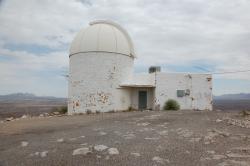
A team of NMSU engineering students, along with an astronomy professor, has set out to make the Tortugas Mountain Observatory operational once again. Clyde Tombaugh, discoverer of Pluto, along with others played an important role in the design, development and operation of the 24-inch telescope that sits atop A mountain, which fell out of use.
The observatory was built in the 1960s and for 25 years the telescope was used extensively to monitor a variety of planetary activities. Because the observatory was built 50 years ago the equipment is outdated. The College of Engineering Manufacturing Technology Engineering Center was asked by the astronomy department to upgrade the telescope and the observatory's dome and door, so that all three could be computer-controlled, rather than manually operated. The changes will allow data to be collected from the telescope remotely and should improve the telescope's performance and efficiency.

In 1974, astronomy professor Reta Beebe took over as head of the planetary group, replacing Brad Smith and Clyde Tombaugh.
When Beebe heard that restoration of the telescope was underway, she said, "I think it's great. It served the role of providing information for targeting the Voyager mission of Jupiter and Saturn. But after that it wasn't possible to get federal funding for a regular program there."
NMSU astronomy professor Jon Holtzman is responsible for overseeing the revitalization project from funding and design to construction. For him, this update of the observatory has been a long time coming.
"We identified people outside the university who would be interested. Last year, we signed an agreement with the American Association of Variable Star Observers," Holtzman said.
The telescope will primarily be used by AAVSO, with certain times reserved for university use. It will be used to monitor time-variable sources-stars that change in brightness over time.
Presently, the university uses Apache Point Observatory, a modern observatory operated by NMSU in the Sacramento Mountains. Holtzman says the refurbished telescope will provide the university with another educational tool to expand research and public outreach, and allow amateurs and professionals from around the world to use the facility.
Official planning for the project begin in summer 2010, and the M-TEC crew, led by manager and lab instructor Charlie Park, started work on the project in December 2010.
"We're about anywhere between 60-75 percent being done. The work involves many different disciplines in one project, which is good for the students," Park said.
Seven students from a variety of engineering disciplines are working under Park's supervision: Lute Stierman, Gabe Moreno, Caleb Sokoll, Jeffery Hutchins, Chris Remley, Josh Garcia and Jose Alanis.
The crew has been tasked with automating the door, dome and telescope, which involves mechanical, structural and electrical engineering. The students are split into three groups to perform a variety of tasks.
They are calculating the motor power necessary to open and close the bay doors, then designing a new motor to replace a hand crank that once was used to open and close doors. They also will design a solar-powered system that will supply the power necessary to operate the doors.
They will design and implement a rotational racking device to monitor and control the dome's positioning using a pre-existing rotational motor. Using electrical, mechanical and manufacturing engineering principles, they will automate the two-axis movement of the telescope.
Finally, they will integrate all components to be compatible with the software system that networks the bay doors, dome rotation and telescope axial controls to the Internet, enabling telescope operation from anywhere in the world.
The students involved have learned a considerable amount about the observatory and telescope itself. Moreno, a mechanical engineering student who has been working with M-TEC for more than a year, views the hands-on experience as an important opportunity to work successfully as a team.
Written by Lorena Sanchez.